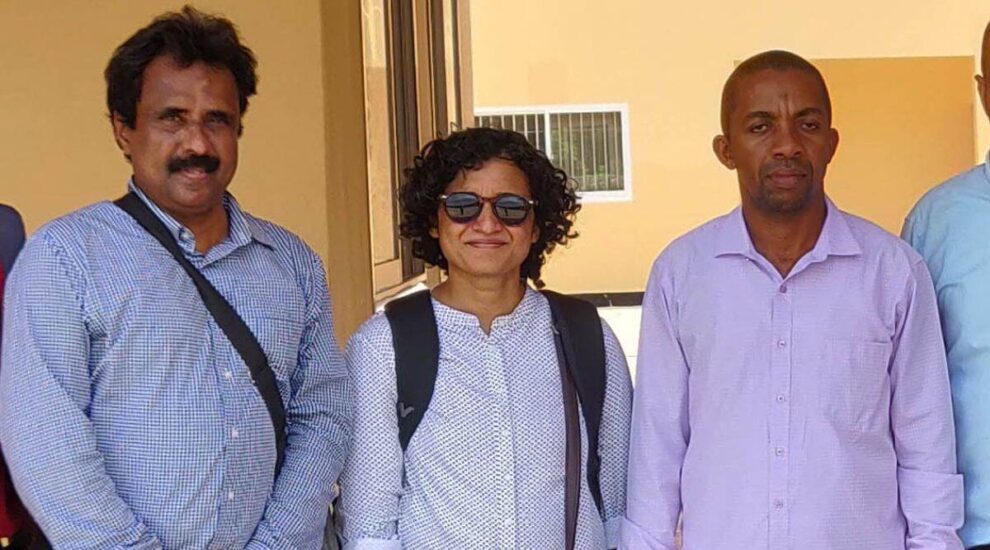The first Indian Institute of Technology (IIT) campus outside the country in Tanzania will also be the first to be led by a woman director, officials said on Monday, while adding that the overseas campus will start with two courses starting this October.
The Union government last Thursday announced that the first IIT campus overseas will be established by IIT-Madras, or IIT-M, in the Tanzanian island city of Zanzibar after an MoU was signed between both countries. The move is in line with the National Education Policy (NEP) 2020, which recommends that “high-performing Indian universities will be encouraged to set up campuses in other countries”.
Preeti Aghalayam, an IIT-M alumna and a professor in its department of chemical engineering, has been appointed as the director-in-charge of the Zanzibar campus, IIT-M director V Kamakoti told a media conference in Delhi on Monday.
“At IIT-M, we are very keen on bringing women into leadership roles. We are following sustainable development goals and one of the important goals suggests that we need to bring in gender balance. Professor Preeti will be the first ever woman to be an IIT director,” he said.
While addressing the media remotely from Zanzibar, Aghalayam said she is honoured to represent the institute and the country. “During our visits to Zanzibar as an IIT-M contingent we had noticed that the representation of women from their side was quite significant. The minister of education in Zanzibar is a woman, their permanent secretary who is a part of our steering committee is a woman, and of course, the President of Tanzania herself is a woman. So, I think it was important that we also consider it mindfully,” she said.
Aghalayam, 49, did her BTech in Chemical Engineering from IIT Madras in 1995, and completed her Phd from the University of Massachusetts Amherst, in 2000. Her research is in the area of Chemical Reaction Engineering and she is an expert in Underground Coal Gasification, Automotive Aftertreatment and CO2 utilization for hard-to-abate sectors
She had joined IIT-M as a faculty in 2010. She also works in the Office of Global Engagement at the institute and handles international academic programs. She was recently acknowledged as one of the 75 Women in STEM by the Principal Scientific Advisor’s office.
Kamakoti said that the registration for admission at their overseas campus has already begun on its official website (https://www.iitm.ac.in/zanzibar/), and soon its senate will finalise the admission process that will include a screening test developed by faculty experts at IIT-M, and an interview.
“The institute will initially offer two courses – a four-year Bachelor of Science (B.Sc) in Data Science and Artificial Intelligence and a two-year master’s in Technology in Data Science and Artificial Intelligence designed by IIT-M. It will cater to students from all over the world, including India, and a total of 70 students, 50 in Bachelor’s course and 20 in Master’s course, will be admitted this year,” he said.
Kamakoti said that faculty will be deputed from IIT-Madras or recruited from India. “Presently the institute will operate out of a temporary campus in Bweleo district of Zanzibar, while the permanent campus spread over 200 acres will be located in Zanzibar Island, and it will be ready by 2026,” he said.
“The faculty strength will be based on required teaching expertise and the quality assurances of IIT-Madras including but not limited to maintaining robust faculty-student ratios,” he added.
The fees will be $12,000 per year for the Bachelor’s course while and $4,000 per year for the Master’s course, the IIT-M director announced, while emphasising that some scholarships may be provided to meritorious students.
Explaining the reason behind starting courses in data science and AI, the IIT-M director said that, during the discussions with ministry officials and heads of academic institutions at Tanzania, the importance of such programmes were highlighted. “The programmes were also planned based on the popularity of the courses in IIT-Madras currently, the potential for future careers, and the aspirations of young people across the world,” he said.
Kamakoti said that IIT-Madras is studying the needs of the country in terms of human capacity building. “Within the next few years, we will offer very strong postgraduate and undergraduate courses and these need not be very conventional courses… We are also planning to start a research park in Zanzibar campus like we have in IIT-M to have more industry and academia collaborations.”
Source: Hindustan Times











